Mahler’s Des Knaben Wunderhorn: which recording to own?
Richard Wigmore
Tuesday, January 16, 2018
These Lieder have enjoyed numerous recordings in both their orchestral and piano versions. Richard Wigmore surveys those featuring all 12 songs and recommends the one to own
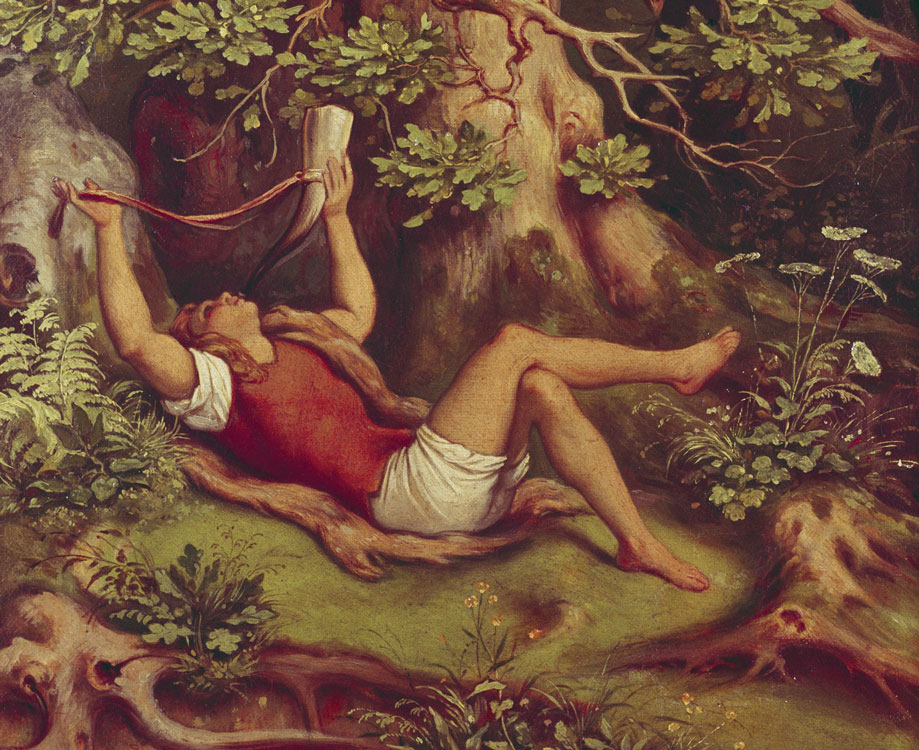
What would one have given to be in the Brahmssaal (as it’s now known) of the Vienna Musikverein on January 29, 1905. In one of the most celebrated of all Lieder concerts, an audience of cognoscenti heard an all-Mahler ‘Lieder-Abend mit Orchester’ that included the Kindertotenlieder, four of the Rückert-Lieder and seven songs from Des Knaben Wunderhorn. Two baritones shared the programme, while a slimmed-down orchestra ensured that Mahler’s fastidiously imagined orchestral textures (each Wunderhorn song has its unique sound palette) emerged with maximum clarity. Conservative-minded critics – and the epithet usually went with the job – were unimpressed. But the composer’s supporters in the capacity audience enthusiastically hailed what was in effect a new concept – the orchestrally accompanied song recital.
In the previous decade Mahler had found relief from the frustrations of his job as director of the Hamburg Opera in his long vacations in the Salzkammergut. It was during these summer respites that he composed most of his songs with orchestra from Des Knaben Wunderhorn (‘The Boy’s Magic Horn’), drawing on the volumes of folksongs and folk poetry published in 1806-08 by Achim von Arnim and Clemens Brentano. These examples of popular, ‘natural’ art – some newly invented, others adapted to contemporary taste – were nostalgically cherished by the German Romantics in a world of encroaching urbanisation. As Heinrich Heine put it, ‘In these songs you can feel the heartbeat of the German people.’
Mahler had surely known many of the Wunderhorn poems since his childhood in the Moravian garrison town of Iglau, where bugle calls, fanfares and marches were part of his everyday experience. It is no accident that he remained haunted by the tales of hussars, drummer boys and sentries, some rooted in the Thirty Years War that had devastated the German lands in the 17th century. In his Wunderhorn songs Mahler treats folksong, military band music, Ländler and Viennese waltzes with mingled affection, irony and tragic realism. As in so much of his music, he delights in juxtaposing seemingly incongruous elements and using popular music (though there are no folk-tune quotations) to distorted, sometimes disturbing ends.
Several of the Wunderhorn Lieder are comic and/or parodistic. The singer dons her dirndl for ‘Rheinlegendchen’, a fairy tale in which the orchestra/pianist mimics a folk fiddler, as well as for the yodelling nonsense song, ‘Wer hat dies Liedlein erdacht?’. Another bucolic Ländler, ‘Des Antonius von Padua Fischpredigt’ (later expanded into the scherzo of the Second Symphony), is Mahler’s caustic commentary on smug bourgeois piety. In ‘Lob des hohen Verstands’, a donkey judges a singing competition between a cuckoo and a nightingale, with predictable results. All his adult life Mahler had suffered at the hands of hostile and cloth-eared critics. How he must have relished getting his own back at his tormentors.
Two of the humorous songs – ‘Verlor’ne Müh’ and ‘Trost im Unglück’, an edgy sparring match between a hussar and his (ex-?) lover – are conceived as a duet for one voice. Several recordings use two singers, here and elsewhere, though Mahler never did. Around half of the Wunderhorn settings are tragedies, replete with Mahler’s compassion for suffering, downtrodden humanity: the dialogue between mother and starving child in ‘Das irdische Leben’, or the doomed, phantasmal soldiers of ‘Der Schildwache Nachtlied’, ‘Wo die schönen Trompeten blasen’ (a Housmanesque colloquy between a girl and the ghost of her soldier-lover), ‘Der Tamboursg’sell’ and ‘Revelge’. In the last, the most bitter of anti-war songs, a defeated regiment parades through the village as a mass of spectral skeletons, to the strains of a heartless quick march.
With dozens of releases featuring only selections from the Wunderhorn Lieder, I have limited my (emphatically not complete!) survey to recordings that include all 12 of the songs composed between 1892 and 1901 and subsequently published as a collection (10 of the songs had appeared in 1899 under the title Humoresken). Some recordings add ‘Urlicht’, incorporated into the Second Symphony, and/or the child’s view of heaven, ‘Das himmlische Leben’, which became the finale of Symphony No 4.
Salon intimacy
Mahler conceived the songs in terms of the orchestra and its kaleidoscopic colours, then swiftly produced publishable voice-and-piano versions. While I always tend to hear the orchestral originals in my mind’s ear, it would be unfair to dismiss the piano versions as mere sketches. By 1978, when he recorded the Wunderhorn Lieder with Barenboim, Dietrich Fischer-Dieskau’s tone could fray at climaxes. He was never a natural charmer; and heartiness can creep into ‘Rheinlegendchen’ and ‘Wer hat dies Liedlein erdacht?’. A hectoring ‘Lob des hohen Verstands’ reminds me of the old saw that a German joke is no laughing matter. Abetted by the hard, brassy timbres that Barenboim conjures from the piano, Fischer-Dieskau delivers swagger galore in the equestrian opening of ‘Trost im Unglück’, though he tries too hard to characterise the girl, arms akimbo, upper lip curled in mockery. But in the tragic songs he is, predictably, in his element. If he can sound too imposing in ‘Der Tamboursg’sell’, he is compelling here and in a magnificently mordant ‘Revelge’, with Barenboim brilliantly ‘orchestrating’ the keyboard part.
A more recent version with piano uses two singers, Diana Damrau and Iván Paley; and, as on several of the recordings with orchestra, they perform some of the songs as duets. I’m ambivalent about the use of two singers in the hallucinatory nocturne ‘Wo die schönen Trompeten blasen’; also in ‘Der Schildwache Nachtlied’ and the political prisoner’s song of defiant bravado ‘Lied des Verfolgten im Turm’, where the girls’ words have a dreamlike unreality. But ‘Verlor’ne Müh’ (where simpering girl vainly woos lumpen swain) and ‘Trost im Unglück’ are that much more vivid when they are sung as mini quasi-operatic scenas. Damrau always gives pleasure with her fresh, gleaming tone and immediacy of response. She catches just the right note of amused scorn in ‘Trost im Unglück’. ‘Wer hat dies Liedlein erdacht?’ is pitch-perfect in its smiling caprice, ‘Das irdische Leben’ graphically characterised. Paley characterises lustily, too, though his baritone lacks colour and firm focus. Why he was allotted ‘Rheinlegendchen’ (here quavery and graceless) and, even more improbably, ‘Urlicht’ is anyone’s guess.
If you want the complete Wunderhorn songs with piano, the version to go for is that by Stephan Genz, in tandem with the ever-sympathetic Roger Vignoles. In ‘Revelge’, Genz is a match for Fischer-Dieskau, giving a hard, sardonic edge to his naturally warm, rounded tone. ‘Rheinlegendchen’ is unselfconsciously charming, and the other humorous songs are nicely understated. Beginning in a tense, barely whispered half-voice, ‘Wo die schönen Trompeten blasen’ is moving by way of its tender restraint. The relentlessly whirring accompaniment of ‘Das irdische Leben’ depicts both the threshing of the corn and, by extension, the pitiless grind of human existence. In its piano version, this song loses less than many of the Wunderhorn songs, especially when Vignoles is involved. He and Genz choose a restrained tempo; and while Mahler’s direction Unheimlich bewegt (‘with sinister motion’) gets its due, Genz emphasises lyrical poignancy, with a mournful colour in the starving child’s pleas for bread.
Lieder-Abend mit Orchester
For obvious financial reasons, piano performances of the Wunderhorn Lieder predominate in the concert hall. On disc, the reverse is true. With two exceptions, all the orchestral recordings use two singers, a baritone (usually Mahler’s preferred voice) and either a soprano or a mezzo. The exact allocation of the songs varies from version to version, as does the ordering, though this can of course be tweaked at the press of a button. It’s worth remembering, too, that Mahler did not think of the songs as a cycle, and never performed more than seven of them in any one concert.
If sexual intercourse, according to Philip Larkin, began in 1963, the modern cult of Mahler was not far behind. By the end of that transformative decade, integral symphony cycles from Bernstein and Kubelík were well underway and three Wunderhorn recordings had appeared in quick succession. First out of the blocks was an all-British affair, with Janet Baker, Geraint Evans and the LPO under Wyn Morris. The conductor once-labelled ‘our Celtic Furtwängler’, is bafflingly prosaic here, with minimal feeling for Mahlerian rubato. Tempos, usually on the fast side, are rigidly held. A pity, as both Baker, singing with her trademark emotional candour, and Evans strike a near ideal balance between vivid character and good, wholesome singing. Baker’s radiance and unsentimental compassion in ‘Wo die schönen Trompeten blasen’ are as memorable as Evans’s vigour and directness in the military songs. He sings ‘Lob des hohen Verstands’ with the resourceful glee that marked his Leporello, Papageno and Fra Melitone.
The conductors on the other two versions from the 1960s are far more natural Mahlerians, with a deep understanding of the music’s central European background. Pride of place goes to the recording from Leonard Bernstein, who did more than anyone to make Mahler palatable to the Viennese, with the husband-and-wife duo of Christa Ludwig and Walter Berry. A drawback here is the dry, boxy recorded sound and the dominance of the New York Philharmonic in the balance. But the performances, with Bernstein at his most incandescent (one or two oddly slow tempos apart), are often compelling. Both artists are singers who place a premium on firm, evenly produced tone and a true, bound line. With Bernstein relishing Mahler’s garish orchestral palette, Berry sings ‘Revelge’ with controlled viciousness, finding a new, ghostly colour for the final section. Ludwig contrasts naturally the two voices of ‘Das irdische Leben’, sung in a single, desperate sweep; and her intense legato pays rich dividends in a poignant, broadly phrased ‘Wo die schönen Trompeten blasen’ and a rapt ‘Urlicht’. The duets all work well, too, not least ‘Der Schildwache Nachtlied’, where Berry swaggers without forcing (many singers are tempted to shout here) and Ludwig brings an aching pathos to the (illusory?) girl’s responses.
More commercially successful in the UK, then and (I suspect) now, was the near-contemporary version from Elisabeth Schwarzkopf and Dietrich Fischer-Dieskau, with the LSO under George Szell. The combination of the world’s most famous (in 1968) Lieder singers, Britain’s then finest orchestra and the gimlet-eyed Szell, renowned for his fastidious attention to balance, promised great things. With superb recorded sound, the promise was largely fulfilled, though you could never accuse either singer of artlessness. I confess I have never been a paid-up Schwarzkopf fan; and the disparity between bright, open vowels and darkly hooded tones, characteristic of her later singing, does disconcert me. For me, she sounds too nudgingly knowing in ‘Rheinlegendchen’ and ‘Lob des hohen Verstands’ (the demotic was never her forte). But her mastery of mood and colour are irrefutable, above all in ‘Wo die schönen Trompeten blasen’, sung here as a duet. No one else matches her haunted sense of foreboding at the opening, or indeed Fischer-Dieskau’s plangent legato in the soldier’s answering Ländler. Abetted by the LSO’s glitter and virtuosity, Fischer-Dieskau brings a harrowing intensity and command of colour to the military songs. ‘Der Tamboursg’sell’ is almost unbearably moving.
A decade later, Philips entered the Wunderhorn stakes with the young Jessye Norman, its new star soprano, in partnership with baritone John Shirley-Quirk and the Concertgebouw Orchestra under Bernard Haitink. The Amsterdam players and the recorded sound are at least a match for the EMI/LSO recording. Norman’s sumptuous tone is heard at its most persuasive in ‘Wo die schönen Trompeten blasen’, floated on seemingly infinite reserves of breath. Elsewhere, she can be straight-laced and word-shy. The duets never quite come alive. Shirley-Quirk, always intensely musical, is too refined for St Anthony’s fishy sermon and the avian singing contest (where Haitink also downplays the vulgarity) but evinces a grave tenderness in ‘Der Tamboursg’sell’.
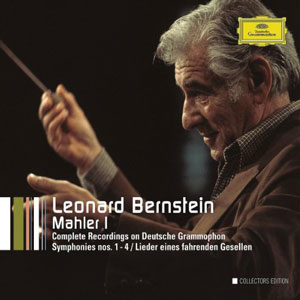
Bernstein’s second Wunderhorn recording, made at concerts in 1987 with Lucia Popp, Andreas Schmidt and the Concertgebouw Orchestra, suffers from an erratic balance and the occasional ensemble imprecision that goes with ‘live’ recording. But the performances are often magnificent, not least the duets: in ‘Lied des Verfolgten im Turm’ (more urgent than in Bernstein’s recording with Berry), Schmidt is ruggedly incisive, heroically refusing to compromise his political principles even when enticed by the enchanting Popp. In ‘Wo die schönen Trompeten blasen’, Bernstein’s eccentrically slow tempo only just avoids sentimentality, and Popp occasionally squeezes her tone both here and in a rapt ‘Urlicht’ (more personal, less hieratic than Ludwig two decades earlier). But criticism seems impertinent in the face of singing of such plangent intensity, simplicity and sophistication held in perfect balance. Schmidt, with his fine dark resonance, is superb in the tragic military nocturnes. Mahler requires the opening lines of ‘Der Tamboursg’sell’ to be sung ‘naively, without sentimentality’, which is exactly what we get here: Schmidt vividly suggests the boy’s feigned stoicism at the start, and then (as the composer indicates) a sense of horror seeps into his tone at ‘O Galgen, du hohes Haus’.
Wunderhorn as chamber music
Writing to Richard Strauss in 1905, Mahler stressed that the Wunderhorn songs should be performed ‘in the manner of chamber music’. Allowing for the four horns demanded by many of the songs, and the mighty battery of percussion in ‘Revelge’, this is how he performed them in that pioneering concert in the Brahmssaal. Strings were scaled down to three or four per part, radically altering the string-wind balance. Two recordings follow Mahler’s lead; and in both, the composer’s characteristically unblended orchestral palette has an added transparency and bite, with each line standing out vividly, not least the snarling muted trumpets. There is much thoughtful, intelligent singing from Thomas Hampson, with the aptly named Wiener Virtuosen. Hampson is effective in sardonic or military mode. But his once-velvet tone has now lost its lustre. He makes heavy weather of the girls’ responses in the duets, while the yodelling ‘Wer hat dies Liedlein erdacht?’ sounds grittily determined rather than blithe.
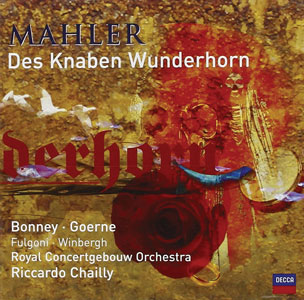
More wholly recommendable is the version from Riccardo Chailly and a slimmed-down Royal Concertgebouw Orchestra, with the lion’s share of the songs taken by Barbara Bonney and Matthias Goerne. Chailly is another idiomatic Mahlerian, and the reduced forces ensure an ideal lucidity in Mahler’s fantastically intricate textures. Goerne sounds miscast in ‘Rheinlegendchen’ and, left to himself (none of the songs are performed as duets), misses the sardonic raillery of ‘Trost im Unglück’. But there are superb things elsewhere. Bonney sings an irresistible ‘Wer hat dies Liedlein erdacht’, woodwind in chuckling collusion, and a pristine, delighted (but not faux naïf) ‘Das himmlische Leben’. As ever, Goerne’s singing is founded on a scrupulously produced legato line, heard to eloquent effect in his desolate ‘Tamboursg’sell’ and the coda of ‘Der Schildwache Nachtlied’, where he distils an unearthly remoteness unmatched in any other recording. It is good, too, to hear ‘Revelge’, Mahler’s sole song for a tenor, performed with an ideal mix of desperate bravado and lyrical pathos by Gösta Winbergh. A fourth singer, contralto Sara Fulgoni, sings ‘Urlicht’ with lovely deep-amber tone but rather fuzzy diction.
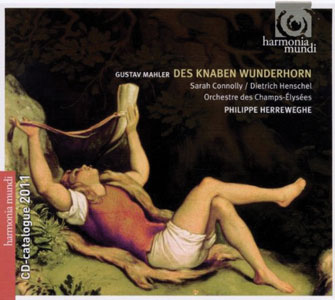
After its forays into Bruckner, Philippe Herreweghe’s period Champs-Elysées Orchestra reached to the brink of the 20th century in a recording with singers Sarah Connolly and Dietrich Henschel. Immediately striking here are the orchestral sonorities, with the slightly veiled gut strings set against the relatively soft-toned woodwind. On the whole, this is a gentler sound picture than we’re used to in Mahler. Connolly, with her glowing, supple mezzo, is well-nigh ideal, singing ‘Rheinlegendchen’ and ‘Wer hat dies Liedlein erdacht?’ with unaffected charm and grace. In ‘Trost im Unglück’, she catches the hussar’s alpha-male bravado without straining for effect, and then suggests a depth of feeling behind the girl’s mocking indifference. Henschel’s high baritone is a splendid instrument; and if he occasionally rants, he brings an aching tenderness to ‘Wo die schönen Trompeten blasen’, done as a solo, like all the songs here. He is magnetic, too, in ‘Der Tamboursg’sell’, and earthily exuberant in ‘Lob des hohen Verstands’, with an apt touch of roughness in his tone.
Picking a winner
Two German recordings made during the past decade are finely played and astutely conducted, but variably sung. With Markus Stenz’s Gürzenich Orchestra, the sturdy baritone of Michael Volle is more appealing than the pleasant but cool soprano of Christiane Oelze. In ‘Wo die schönen Trompeten blasen’, Oelze sounds detached, outshone in tragic pathos by the Cologne woodwind. Casting a leading Sachs and Beckmesser in ‘Rheinlegendchen’ was always going to be a leap of faith. But Volle comes into his own in the sermon to the fishes and harnesses the power of his baritone to chilling effect in ‘Revelge’, with the orchestra second to none in lurid violence.
As David Gutman noted, the veteran ‘modernist’ Michael Gielen proves a highly perceptive, and idiomatic, Mahlerian, with an acute ear for textural clarity – though, in the lively acoustic, a true pianissimo is at a premium. His singers are only so-so. Robust of tone and manner, Hanno Müller-Brachmann is better at characterisation than sustaining a line. His graceless ‘Rheinlegendchen’ is another piece of miscasting. Soprano Christiane Iven sounds uncomfortable in ‘Das himmlische Leben’, though she excels in the desperate race against the clock of ‘Das irdische Leben’ and uses the mezzo colouring within her soprano in a hushed, concentrated ‘Urlicht’.
Given the cast list, expectations ran high in the ‘live’ recording by Magdalena Kožená and Christian Gerhaher conducted by Pierre Boulez and caught on both CD and DVD. Although I hear more than the ‘disinterested efficiency’ noted by Richard Osborne, Boulez’s scrupulously calibrated conducting can lack Mahlerian Schwung, as well as the feeling for the Viennese-Slavonic dance rhythms (say, in ‘Verlor’ne Müh’) caught so unerringly by Bernstein and Szell. Gerhaher sings ‘Trost im Unglück’ (as a solo) with incisive diction and a free ring to the tone. But his characterisation is fatally hampered by Boulez’s dogged tempo. You’d never guess here that Mahler’s direction is verwegen (‘boldly’, or ‘jauntily’). Set against that is the sardonic brilliance of ‘Revelge’, its implacable rhythms tightly laced, and a compelling, ultimately heartbreaking ‘Tamboursg’sell’, where Boulez notes Mahler’s request for two in a bar (most conductors veer towards a slower four). Kožená and Boulez eschew charm in the Ländler – this is even more apparent on the DVD. But she ‘sells’ ‘Lob des hohen Verstands’, with the clarinet-as-ass outshrieking the competition; and, sounding like a mezzo Popp, she brings a touching purity and warmth – and a rarefied pianissimo – to ‘Wo die schönen Trompeten blasen’.
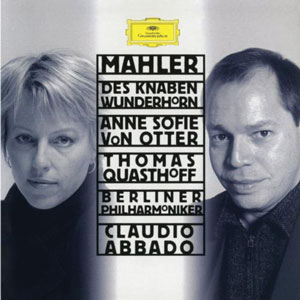
Where Boulez’s brisk conducting of ‘Das irdische Leben’ is neat and precise, Claudio Abbado’s, with Anne Sofie von Otter, is eerily unnerving, with more extreme dynamic contrasts and more astringent sonorities. Von Otter graphically suggests the mother’s mounting panic beneath her reassuring answers to the child’s pleas for bread. In ‘Verlorn’e Müh’ she expertly catches both the girl’s wheedling and the boy’s sullen responses, singing as it were through clenched teeth. And, given a delightful dance lilt by Abbado, she embodies Mahler’s description of ‘Rheinlegendchen’ as ‘direct, but whimsically childlike and tender…nothing but butterfly colours’.
Abbado’s baritone is Thomas Quasthoff who, more than any other singer, notices how much of ‘Revelge’ is marked piano and pianissimo. With a care for a true singing line, even in extremis, Quasthoff evokes the pathos and pity of war as well as its fury and horror. Like von Otter, he brilliantly distinguishes the ‘characters’ in the duet songs, never straining for effect: in the contrasts of swagger and dreamlike tenderness in ‘Der Schildwache Nachtlied’; or in a notably good-humoured ‘Trost im Unglück’. And he and Abbado note Mahler’s direction behäbig (‘complacently, with an implication of portliness’) in ‘Des Antonius von Padua Fischpredigt’. If fish can lollop, they do here.
Time, then, to come clean. For all the insights on the justly famous Szell recording, Schwarzkopf tends to provoke more irritation than illumination. I could live happily with the versions from Chailly and his quartet of singers; Herreweghe with Connolly and Henschel; and Bernstein with Popp and Schmidt, who do several songs as duets – though, happily, not ‘Wo die schönen Trompeten blasen’, in which Popp is supreme. Yet confined to a single recording, I should plump, narrowly, for Abbado, with von Otter and Quasthoff. DG’s engineers and Abbado’s ear ensure that Mahler’s orchestral palette has never sounded more vivid. And his singers not only have expressively flexible voices but also strike a fine balance between folk-like directness and sophistication: crucial in songs that mine what Mahler called the ‘hidden treasure’ within the ostensibly naive texts, transmuting the banalities and tragedies of the forgotten into unflinching commentaries on the universal human condition.
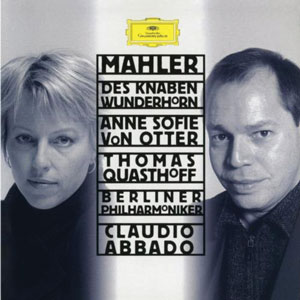
Top Choice
Von Otter mez Quasthoff bar BPO / Abbado
DG
As part of this dream Mahler team, Quasthoff sings ‘Fischpredigt’ with just the right unexaggerated drollery, as the superlative Berlin wind cavort around him. Von Otter brings an unforced eloquence to her songs, culminating in a rapt, glowing ‘Urlicht’.
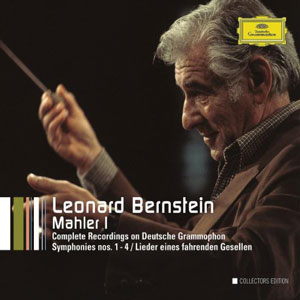
A Close Second
Popp sop Schmidt bar Concertgebouw Orch / Bernstein
DG
Bernstein, at his most magnetic here, notices everything and exaggerates (almost) nothing. With that distinctive sharp edge to her tone, Popp sings a nicely acerbic ‘Fischpredigt’ and a nonpareil ‘Wo die schönen Trompeten blasen’.
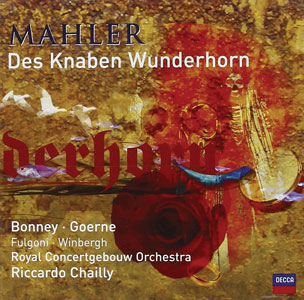
Chamber Scale
Bonney sop Fulgoni mez Winbergh ten Goerne bar RCO / Chailly
Decca
There is an ideal transparency of texture here. Goerne is perfect in Mahler’s innig mode; Bonney is delightful in duet-for-one ‘Verlor’ne Müh’; and Winbergh’s distinctively open, Scandinavian tone and dramatic flair make for a magnificent ‘Revelge’.
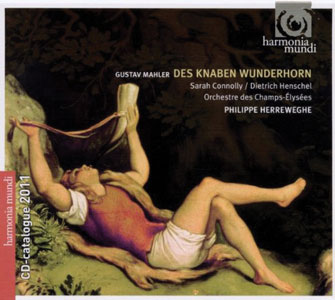
Period Sonorities
Connolly mez Henschel bar Champs-Elysées Orch / Herreweghe
Harmonia Mundi
Recreating a late-19th-century sound palette, Herreweghe proves a natural Mahlerian, not least in the easy lilt he brings to the Ländler. Henschel precisely gauges the military and comic songs, while Connolly’s ‘Urlicht’ is one of the loveliest on disc.
Selected Discography
Date / Artists / Record company
with piano
1978 Fischer-Dieskau bar Barenboim pf (EMI/Warner)
2003 Damrau sop Paley bar Lademann pf (Telos; Profil Medien)
2007 Genz bar Vignoles pf Hyperion
with orchestra
1965 Baker mez Evans bass-bar LPO / Morris (IMP Classics)
1967/69 Ludwig mez Berry bar New York PO / Bernstein (Sony)
1968 Schwarzkopf sop Fischer-Dieskau bar LSO / Szell (EMI/Warner)
1976 Norman sop Shirley-Quirk bar Concertgebouw Orch / Haitink (Philips)
1987 Popp sop Schmidt bar Concertgebouw Orch / Bernstein (DG)
1998 von Otter mez Quasthoff bar BPO / Abbado (DG)
2000 Bonney sop Fulgoni mez Winbergh ten Goerne bar RCO / Chailly (Decca)
2005 Connolly mez Henschel bar Champs-Elysées Orch / Herreweghe (Harmonia Mundi)
2009 Oelze sop Volle bar Gürzenich Orch, Cologne / Stenz (Oehms)
2009/11 Iven sop Müller-Brachmann bar SWR SO, Baden-Baden & Freiburg / Gielen (Hänssler)
2010 Hampson bar Wiener Virtuosen (DG)
2010 Kožená mez Gerhaher bar Cleveland Orch / Boulez (DG)
This article originally appeared in the October 2016 issue of Gramophone. To read fascinating and authoritative features about the greatest classical works every month, subscribe to Gramophone: gramophone.co.uk/subscribe











